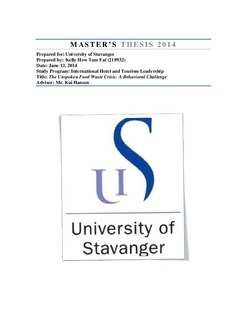The unspoken food waste crisis: a behavioral challenge
Master thesis
Permanent lenke
http://hdl.handle.net/11250/223469Utgivelsesdato
2014-06-13Metadata
Vis full innførselSamlinger
- Studentoppgaver (SV-NHS) [618]
Sammendrag
Food waste has been linked to the elevated level of methane gases that presents threats to the environment and a somber future for the years to come. Understanding the food waste phenomenon through the post-consumer behavior is key to achieving a sustainable future. Behavioral analysis can offer the methods to recognize the determinants and driving force behind food waste in households.
Efforts to raise awareness and create campaigns to reduce food waste will only succeed if they are supported by and with the collaboration of all the actors of the food chain.
Using a qualitative design and partial grounded theory, 10 residents of Norway were interviewed based on the theoretical framework of the theory of planned behavior (TPB). The interviews took effect during the period of February to April 2014 focused on the participants’ attitudes and behavior on food waste and their intention on reducing food waste. The interviews demonstrated that the public experienced a lack of awareness on food waste as compared to recycling that was highly marketed. The findings indicated that the intention and willingness to participate in the behavior was influenced by societal moral standards, gender differences & external influence but also inhibited by the lack of awareness, perceptions and (in)convenience.
The study raises the need for further research at the post-consumer waste to fully understand the intention, behavior and attitudes before investing into campaigns.
Beskrivelse
Master's thesis in International Hospitality Management
